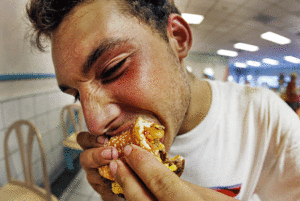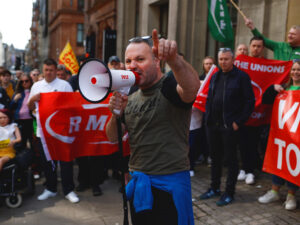There is a saying at McDonald’s: “‘tits on tills’ — boys in the kitchen, girls on the counter.” The idea, as a 22-year-old former worker described in a recent BBC report, is “to put attractive people at the front”. Human beings, in other words, are objectified.
The Bible declares that those who do not work shall not eat, and our secular society clings onto that idea: the harder you work, the greater your reward ought to be. There is a glut of articles, for instance, expressing outrage at how many junior doctors are paid less than fast-food workers. If you’re being compared to a McDonald’s employee, you know it’s bad.
I worked in McDonald’s for a few years, and it’s true: the wages set the lowest bar. If junior doctors are earning so little, that is a scandal. But drawing attention to the paltry pay of working-class people just so you can make a point about the treatment of overwhelmingly middle-class public servants isn’t exactly progressive.
Fast-food work is derided because it’s an “unskilled” job that supposedly any fool can do. It was my first job, and the same was true for many of the people I worked with. Three quarters of McDonald’s employees are under the age of 25. The workforce at my store was young and diverse, many coming from immigrant backgrounds, very few of us university educated. The sort of people ignored by society.
Around 100 current and recent McDonald’s staff have recently testified, in a BBC report, to enduring a toxic culture of sexual harassment, bullying and racism. Female workers as young as 16 described experiences of groping and intimidation, from both customers and staff members. Managers were accused of turning a “blind eye”.
Though I can’t testify to personally witnessing any sexual harassment while I worked at McDonald’s, I did hear about it. When I first started, a male crew member who was notorious for hitting on female colleagues was suspended for making inappropriate sexual comments. He left soon afterwards. There was also a 16-year-old worker was hit on by a middle-aged, lecherous dad, while he was overseeing his own 11-year-old daughter’s birthday party.
To some extent, such objectification is true of any workplace. In History and Class Consciousness, the Marxist György Lukács developed the concept of “reification”, which describes how, in a capitalist society, human relations are treated as relations between things. Human themselves are treated as objects, while abstract ideas like “capital” or “the market” become active subjects that determine human activity. In other words, humans are controlled by capital, rather than vice-versa.
Being a fast-food worker is perhaps the most extreme example of this condition. It is a job that allows no room for autonomy. For a good portion of my day, I was a piece of equipment that the bosses had paid for, and they wanted to get their money’s worth. Orders were issued from on high, the managers enforced them, and I was supposed to obey them without question, on pain of sanctions such as getting fired or denied decent hours. We were all overworked, because the store was understaffed — unless it was a Friday or Saturday night. Management needed to keep labour costs as low as they could get away with, to maintain profitability. There were busy shifts when I would be dumped on fries, to cook them and box them by myself, hour after hour. On summer days, it was excruciating.
Because the job is so monotonous and automatic, I felt like I was more robot than person. Working in McDonald’s made me feel what Marx meant by his theory of “alienation”, as opposed to just understanding it as an abstract intellectual concept. Alienation, for Marx, was how workers became estranged from the product of their labour, never reaping the benefits of production. It’s something that is impossible to complain about, when you feel like you’re just another cog in a machine, disposable and easily replaceable. When your work is seen as near-worthless, it’s hard to protest that you are being underpaid for what you help produce shift after shift.
Customers often reinforce this feeling. There is a general belief that people working in the food industry are servants and, therefore, lesser beings. Places such as McDonald’s cater to the masses; in their own work stations, its customers will often experience the same anxiety, alienation and precariousness. But McDonald’s is one of the few spaces where someone, downtrodden by their own boss, can feel like they have power — where they, as the customer, are king.
Those who exploit this transaction know that the power relations are lopsided in their favour. If they become aggressive and hurl abuse at a fast-food worker, for mostly minor infractions, the worker can’t defend themselves. They must maintain their composure, respond politely and just take the abuse on the chin. Otherwise, they may be damaging the company’s reputation for providing quality customer service, and even risking their job. I know of someone who was “written up” for getting angry at a customer who was swearing at him while complaining about cold fries. Usually if you have three write-ups, your contract will be terminated.
Meanwhile, the ubiquitous presence of CCTV cameras reminded us that we were always being watched. Indeed, McDonald’s must have recorded so many incidents of sexual harassment and bullying against workers. Yet footage is seldom used to bring about justice. One of the workers who testified in the BBC story said that, even though her sexual harassment was caught on camera, she had to carry on working with the perpetrator.
The harassment and bullying that goes on within McDonald’s isn’t simply a problem of gross lechers, then; it is a symptom of structural tendency in these workplaces to objectify human beings. It is a symptom, too, of the precarity of the job market for young people. Many of those I worked with had second jobs, often similarly low-waged, just to bolster their paltry income.
Perhaps part of why fast-food work is devalued is because the food served is seen as a vulgar indulgence, unlike junior doctors. But in this respect, how is it different from other source of pleasure? People want to eat fast food, and someone has to serve them. Those servers work long, hard hours. Beyond deserving basic respect, they should be able to earn a living, afford decent housing and a social life, raise a family.
But McDonald’s won’t give them these things, unless pressed. “Capital,” as Marx rightly stated, “is reckless of the health or length of life of the labourer, unless under compulsion from society.” Fast-food restaurants have got away with treating their workers badly simply because they can; but they have been enabled by a tacit view, among the public, that these workers are somehow unworthy. It’s tempting to see the unionisation drives and strikes that have occurred in the past few years as the beginning of a fairer era. But it’s also hard to imagine a future in which fast-food workers aren’t the benchmark for bad wages, offered in exchange for their humanity.
Disclaimer
Some of the posts we share are controversial and we do not necessarily agree with them in the whole extend. Sometimes we agree with the content or part of it but we do not agree with the narration or language. Nevertheless we find them somehow interesting, valuable and/or informative or we share them, because we strongly believe in freedom of speech, free press and journalism. We strongly encourage you to have a critical approach to all the content, do your own research and analysis to build your own opinion.
We would be glad to have your feedback.
Source: UnHerd Read the original article here: https://unherd.com/




